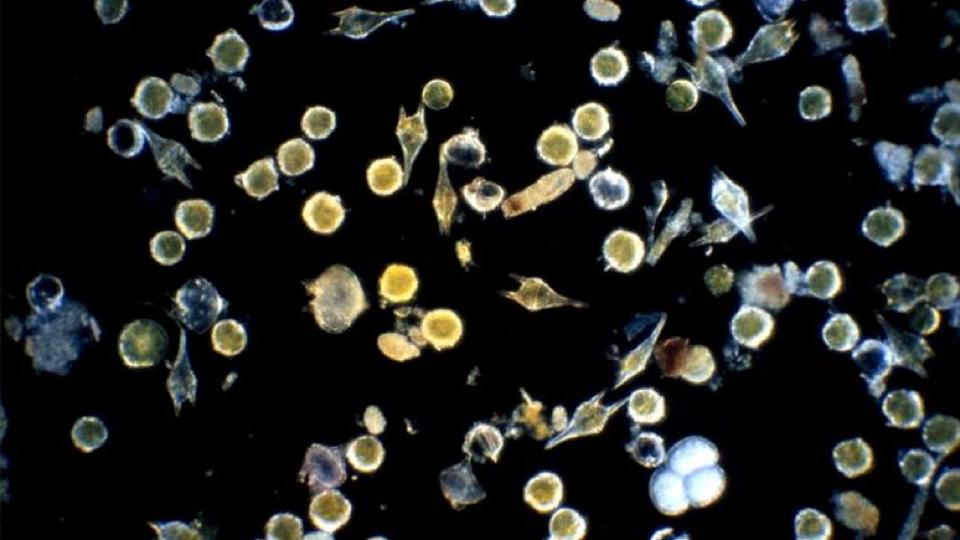Fact check: False claim that 90% of plankton has been lost in Atlantic Ocean
The claim: Plankton in the Atlantic Ocean is 90% gone
The plankton in the world’s oceans are being affected by climate change, according to experts, but a claim spreading on social media gives a particularly dire assessment of the situation.
“Plankton in the Atlantic Ocean is 90% gone,” reads a July 19 Facebook post shared more than 5,800 times.
“In what could be the most disturbing news in ocean conservation, if not human history,” the post continues, “data reveals worse than expected state of plankton – the foundation of life on Earth – with a 90% drop in the Atlantic, driving another nail in the coffin of our dying ocean.”
A similar post on Instagram accumulated more than 40,000 likes before it was deleted.
Follow us on Facebook! Like our page to get updates throughout the day on our latest debunks
The posts both pointed to research by the Global Oceanic Environmental Survey, but the author of that research told USA TODAY it doesn’t support such a broad claim. That survey was a limited survey of plankton in the equatorial Atlantic Ocean at 15 degrees north latitude.
In response to an inquiry from USA TODAY, the Facebook user replied another post would be coming with more information from researchers at the ocean survey. That update had not been published as of July 29.

A 90% decline would be ‘instantly noticeable,’ expert says
Plankton are a diverse array of tiny organisms that drift freely in the ocean and are “important to the ocean ecosystem and very sensitive to changes in their environment,” according to the National Ocean Service.
Plankton populations are changing, David Johns, head of the Continuous Plankton Recorder Survey, said but none of the research by his group has shown the sort of decline described in the claim.
"They are responding in many cases to climate change, but it depends on the region and plankton type," he said. "Some are going up, some are going down."
Such a significant decline in the plankton population would be “catastrophic and instantly noticeable,” Johns told USA TODAY in an email.
“So much marine life, from fish to whales and seabirds, critically depends on plankton,” Johns said.
Fact check: NASA says modern climate change caused by human activity, not solar orbital cycles
Howard Dryden, lead author of the Global Oceanic Environmental Survey research cited by the social media posts, said in an email to USA TODAY the group’s research was limited to the equatorial Atlantic Ocean.
“Plankton density in the equatorial Atlantic is low in comparison to the temperate and higher latitudes of the Atlantic, so low plankton counts are to be expected in the equatorial regions,” he said.
The amount of plankton found during the group's research was still "exceptionally low," Dryden said.
Johns said his group’s research has found certain types of cold-loving plankton have shifted northward to colder water, while plankton that thrive in warmer water have also moved north as “conditions in those areas become more favorable.”
“These changes have led to populations in the areas changing as species move into areas more suitable for them,” he said.
The Continuous Plankton Recorder Survey has been using recorders on merchant shipping routes in the north Atlantic Ocean for more than 70 years and has analyzed more than 250,000 samples in that time period, Johns said.
“We take samples all over the place every month, and we are still getting lots of plankton,” Johns said.
The Associated Press has previously debunked the claim.
Our rating: False
Based on our research, we rate FALSE the claim that plankton in the Atlantic Ocean is 90% gone. The claim is based on research that was limited to a specific region of the Atlantic Ocean. Experts say such a significant drop in the plankton population would be immediately apparent and have drastic consequences for the rest of the ecosystem. There have been some observable changes to plankton populations as a result of climate change, but nothing close to the massive drop described in the claim, experts say.
Our fact-check sources:
Howard Dryden , July 26, Email exchange with USA TODAY
David Johns , July 26, Email exchange with USA TODAY
Global Oceanic Environmental Survey, accessed July 28, GOES Atlantic plankton and pollution survey
Global Oceanic Environmental Survey, accessed July 28, Climate change…have we got it all wrong?
Continuous Plankton Recorder Survey, accessed July 28, About the CPR Survey
National Ocean Service, accessed July 27, What are plankton?
Oregon State University, accessed July 27, Plankton Ecology Laboratory
Earth System Science Data, accessed July 26, The Plankton Lifeform Extraction Tool
Associated Press, July 26, Atlantic Ocean has not lost 90% of its plankton
Thank you for supporting our journalism. You can subscribe to our print edition, ad-free app or electronic newspaper replica here.
Our fact-check work is supported in part by a grant from Facebook.
This article originally appeared on USA TODAY: Fact check: Atlantic Ocean hasn't lost 90% of plankton

